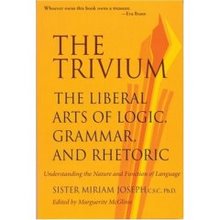From Where Do We Get Our Culture?
While reading about the concept of a Classical Education, I came across what I feel is an extremely relevant concept with regard to culture and civilization.
The concept is, "the student learns that our Culture and Civilizations is an outgrowth of the classical, medieval and reformation world. Modern students must learn that our culture was not purchased for them by their parents at the mall."
I am a firm believer that we are products of our environment, and what we surround ourselves with has a lasting effect on who we are and how we think.
Recently, I was working with a child, and we were discussing the usage and spelling of a few words such as valley, and crane. When I asked the child "do you know the meaning of the word valley?" the child replied, with complete confidence, "of course, that is when the man comes out and parks your car for you."
The second word, crane was a bit more difficult, because it is a homonym, and can only be understood through its contextual usage. Fair play, but, when then child looks around, and without hesitation blurts out, "of course I know what a crane is, everybody knows what a crane is, look on top of all of the buildings, those are cranes!"
This exchange immediately brought to mind two books, "The Price of Privilege" and "Last Child in the Woods-Saving Our Children from Nature Deficit Disorder Syndrome."
The first book, "The Price of Privilege" addresses the concepts of parenting in the age of affluence, and the need for parents to teach children how to manage emotions and impulses, form healthy relationships, think for themselves, and become useful, well adjusted, and moral human beings.
The second book, "Last Child in the Woods" sets out to link the absence of nature in the lives of today's wired generation to some of the most disturbing childhood trends: the rise in obesity, attention disorders, and depression.
As parents we must constantly be aware of what our children are telling us, because it is nothing more than their reiterating what we are telling them. Let's constantly remind ourselves of our responsibility to our children, and never forget, "we reap what we sow!"



2 comments:
Thank you for such an articulate and well-thought-out response. I was one of the mothers interviewed by the NY Times. Please click on the link below to read what REALLY was said during the interview.
Wassalaam,
Hina
http://www.sunnisisters.com/?p=2863
Sister Hina,
Thank you for having the courage and clarity to speak about this gross misrepresentation.
Post a Comment